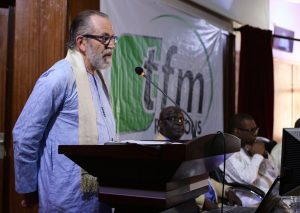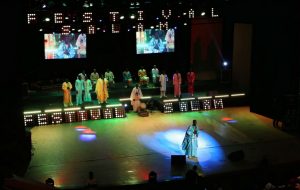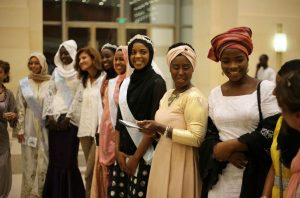International Conference on Sufi Performance Strengthens Ties between UNC and UCAD
June 29, 2017Center for Middle East and Islamic Studies
The University of North Carolina at Chapel Hill and the University Cheikh Anta Diop (UCAD) collaborated together on the international conference “ZIKR | Locating Sufi Performance: Critical Perspectives on Music, Ritual and Remembrance,” held in Dakar, Senegal, June 5-7, 2017.
This was the first joint conference held in partnership between the two institutions, which have had a Memorandum of Understanding (MOU) since 2009. Key members of the conference planning committee included Carl Ernst, William R. Kenan Jr. Distinguished Professor of Religious Studies and co-director of the Carolina Center for the Study of the Middle East and Muslim Civilizations; Michael Figueroa, assistant professor of music at UNC; Ibrahima Thioub, rector of UCAD; and Mamarame Seck, research professor at UCAD’s l’Institut Fondamental d’Afrique Noire.
Conference presenters included six scholars from the United States, two each from Turkey and Europe and five from Senegal.
The program began on June 5 with opening remarks, followed by an intercultural conversation on Sufi performance and music in Turkey and Senegal featuring Penda M’Bow, former Senegalese Minister of Culture. The conference included three days of scholarly presentations in the fields of ethnomusicology, history and music, followed by three days of travel to significant religious sites throughout the country.
Zikr
Sufism is usually defined broadly as Islamic mysticism and is frequently viewed as transcending beyond the confines of narrow religious identities. In practice, Sufi traditions are inescapably local, defined by particular lineages of masters and disciples and frequently centered on very physical shrines to local Sufi saints.

“While Qur’anic references are common in Sufi performance, and Arabic texts may be frequently performed in non-Arabic environments, local languages and musical idioms play defining roles in the experience of Sufi rituals, particularly the central practice of zikr, the recollection of the divine,” explained Ernst.
Conference presentations highlighted regional cultures associated with South and East Asia, North and West Africa and Turkey, connecting them to larger patterns in Sufi practice and tradition.
Post-conference Excursions
Following the conference presentations, participants traveled to prominent religious sites in Senegal. Organized by Mamarame Seck, the excursion included stops in the country’s holiest cities, each one the site of the leadership of a Sufi order and annual pilgrimage.
Almost all Senegalese Muslims belong to one of three Sufi orders: Tijaniyya, Mourides and Qadiriyya. Meetings were arranged with the khalifas (spiritual successors) of each of these orders, along with presentations of Sufi spiritual music. Meeting with these prominent leaders in Senegal was a tremendous honor, demonstrating a desire to increase global understanding of Islam and its cultural significance in Senegal.
On June 7, participants visited Ndiassane, site of the Qadiriyya order, as well as Tivaouane, site of the Tijaniyya order. On June 8, they traveled to Touba, the second most populated Senegalese city after Dakar, capital of Mouridism and the burial place of its founder, Cheikh Amadou Bamba. Amadou Bamba a prominent spiritual leader and an important figure in non-violent resistance to French colonialism. Participants visited the Great Mosque that is home to his tomb, as well as a library filled with his writings.

Salam Festival
The conference was held in conjunction with the Salam Festival (Peace Festival), a major cultural event sponsored by prominent Senegalese musician, Youssou N’Dour. The Salam Festival is a festival of spiritual Sufi performance. Since its founding in 2015, it has taken place during the month of Ramadan and brings together local and international artists connected to the Sufi tradition for two weeks of evening performances.
By linking with research professors from universities in Europe and the U.S. in collaboration with their colleagues at UCAD, the Salam Festival is the first of its kind to engage scholars with Senegalese Sufi music and to stimulate dialogue on this growing area of research.
The conference proceedings and post-conference tour was filmed by the Senegalese television channel, Télé Futurs Medias (TFM), which is part of multi-media organization Groupe Futurs Medias, founded by Youssou N’Dour. The footage will be edited and broadcast to share the conference with the wider country. TFM is one of the most watched stations in the country.
Future collaborations
This conference is part of the growing collaboration between UCAD and UNC-Chapel Hill; it has strengthened relationships between scholars in the United States, Europe, Turkey, and Senegal. Future collaborations will include workshops organized by the UNC Department of Religious Studies and held at UCAD for graduate students in the humanities and social science. In the coming months, UNC and UCAD will continue to explore continued opportunities for partnership.


The scholars from Turkey were accompanied by a Turkish group affiliated with the Turkish Women’s Cultural Association (TURKADD), a group that also has connections to the religious studies program at UNC, endowing the Kenan Rifai Distinguished Professorship of Islamic Studies in 2009. The conference provided an opportunity to establish relationships between scholars in Senegal and Turkey, and it began a dialogue on possible south-to-south collaborations.
This was the second of two conferences associated with the 2016-2017 Carolina Performing Arts year-long festival of Sufi performance. The first, “Islam and Religious Identity: The Limits of Definition,” took place at UNC October 14-16, 2016 and examined the diversity of cultures around the world that shape religious practice and experience.
This conference was sponsored by the Andrew W. Mellon Foundation; Carolina Performing Arts’ Arts@TheCore; UNC Center for Global Initiatives; Carolina Performing Arts; UNC Department of Religious Studies; UNC Institute for the Arts and Humanities; West African Research Center (Dakar); University Cheikh Anta Diop; with additional support from the Chancellors Global Education Fund through UNC Global.
